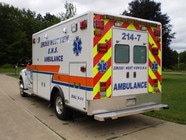The EMS rotation is designed to a a longitudinal and progressive experience in medical direction and prehospital response. Rotations can be tailored to the individual resident's area of interest and expertise. Subsequent years will build upon the foundation created during the PGY-1 experience.
Introduction and Overview of the Emergency Medical Services Curriculum
The first year resident will be introduced to the overall structure and function of EMS. Core experience include completion of the Pennsylvania medical command course, the Federal Emergency Management Agency's Incident Command System courses, and actual rotations with one of the affiliated ground based EMS services. EMS services in the metropolitan Pittsburgh and surrounding areas represent a mix of urban, third service, volunteer, and private EMS agencies. Residents will typically dedicate one emergency medicine shift to riding along with emergency medical technicians and paramedics. Finally, residents will complete reading assignments that are relevant to the structure and organization of prehospital response services. EMS faculty will provide an, "EMS orientation" at the beginning of the year, and EMS residents are expected to complete a total of 16 EMS activities by the completion of their training. Residents will schedule ride alongs and continuing education sessions with affiliated services, and activities will be approved in advance by EMS faculty members.
Affiliated EMS Services and Contact Information

The program's Chief Residents will provide intern physicians with a ride along schedule. Please report promptly to your assigned shift/location and notify the chiefs if you're unable to make it to a shift. Residents are encouraged to wear comfortable clothes and closed-toed shoes. Residents should bring their instititional ID badge and a stethoscope with them to their assigned shift. It also helps to bring some cash along so that you can participate in any community/fire house dinner arrangements. Affiliated services include:
The purpose of the experiential and clinical rotations in EMS is to familiarize the emergency medicine intern with prehospital operations, equipment, and training. Physicians will participate in the delivery of prehospital care and conduct patient history and physical assessments in the uncontrolled and often unpredictable environment of an emergency medical services "scene." Basic principles of "scene safety" and initial triage are continually emphasized.
- Ross / West View EMS
- Northwest EMS
- Prehospital Response (Forbes Regional Hospital)
- LifeFlight aeromedical and critical care transport program
The purpose of the experiential and clinical rotations in EMS is to familiarize the emergency medicine intern with prehospital operations, equipment, and training. Physicians will participate in the delivery of prehospital care and conduct patient history and physical assessments in the uncontrolled and often unpredictable environment of an emergency medical services "scene." Basic principles of "scene safety" and initial triage are continually emphasized.
Introductory Reading Curriculum
Readings are abstracted from the National Association of EMS Physician's "Emergency Medical Services Clinical Practice and Systems Oversight" two volume text.
1. EMS System Design
2. EMS Personnel
3. Review EMS provider certification and training levels (hosted on this website)
4. Review organization of EMS in Pennsylvania (hosted on this website)
1. EMS System Design
2. EMS Personnel
3. Review EMS provider certification and training levels (hosted on this website)
4. Review organization of EMS in Pennsylvania (hosted on this website)
Federal Emergency Management Incident Command System Courses
The "Incident Command System" is a nationally recognized classification system that facilitates an orderly response to large scale incidents or disaster. The ICS grew out of the United States Forest Service wildand fighting operations. It became clear that a unified mehtod of communication was imperative in order to ensure provider safety and an accepted division of responsibility. Hospitals have adopted components of the Incident Command System to provide guidance to administrators and health care providers through the challenges of operational emergency preparedness. The Federal Emergency Management Agency provides these courses free of charge, and first year residents are required to complete two courses:
1. Introduction to the Incident Command System
2. ICS for Healthcare Professionals
1. Introduction to the Incident Command System
2. ICS for Healthcare Professionals
Commonwealth of Pennsylvania Medical Command Course
All physicians who are tasked with the oversight of emergency medical service providers will have completed a medical command course. The course is hosted on-line and provides a thorough overview of the expectations and obligations of a command physician. This introductory course is the initial step towards credentialing as a "Prehospital Physician" or director of an authorized medical command facility. The train website is located at: https://pa.train.org. Instructions to set up a new account are contained on the Train PA-EMS website. Upon successful completion, resident physicians will be assigned a unique identifier to use when providing on-line guidance to responding emergency medical service agencies.
For detailed instructions about how to obtain a Pennsylvania Medical Command Physician Number
please visit the dedicated EMS MEDICAL COMMAND PAGE
All physicians who are tasked with the oversight of emergency medical service providers will have completed a medical command course. The course is hosted on-line and provides a thorough overview of the expectations and obligations of a command physician. This introductory course is the initial step towards credentialing as a "Prehospital Physician" or director of an authorized medical command facility. The train website is located at: https://pa.train.org. Instructions to set up a new account are contained on the Train PA-EMS website. Upon successful completion, resident physicians will be assigned a unique identifier to use when providing on-line guidance to responding emergency medical service agencies.
For detailed instructions about how to obtain a Pennsylvania Medical Command Physician Number
please visit the dedicated EMS MEDICAL COMMAND PAGE
Sample Calendar of PGY-1 EMS Experience
JULY
-Intern orientation
-Complete online FEMA/NIMS lectures
AUG-MAY
-Completion of EMS ride alongs with affiliated services
MAY-JUNE
-Online modules hosted on PA train / state EMS education website and obtain PA Command Number
JULY
-Intern orientation
-Complete online FEMA/NIMS lectures
AUG-MAY
-Completion of EMS ride alongs with affiliated services
MAY-JUNE
-Online modules hosted on PA train / state EMS education website and obtain PA Command Number